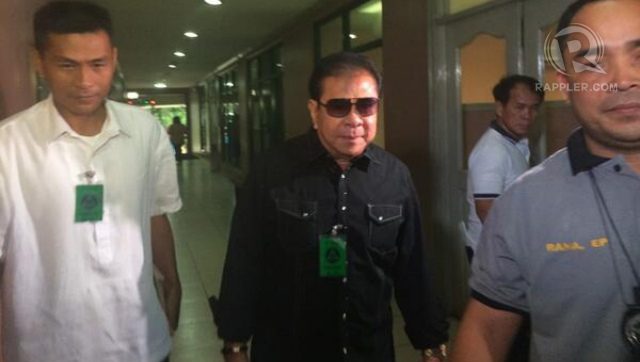SUMMARY
This is AI generated summarization, which may have errors. For context, always refer to the full article.

The court finds merit in the ex-governor's argument that he was deprived of his constitutional right to a speedy disposition of cases
MANILA, Philippines – A decade of delay in the preliminary investigation of the graft complaints against former Ilocos Sur Governor Luis “Chavit” Singson was cited by the anti-graft court Sandiganbayan as grounds for the dismissal of his cases.
The Sandiganbayan acquitted Singson on Wednesday, August 20, from 3 counts of graft over the alleged diversion of P26 million ($593,811) in tobacco excise tax from his province to a private company.
The court’s 3rd division issued a resolution granting Singson’s move to quash the charge sheet against him. The resolution, penned by Justice Alex Quiroz, effectively dismissed his cases.
The court found merit in the argument that the accused was deprived of his constitutional right to a speedy disposition of cases.
“The period of nine (9) years is unusually long period of time for the Office of the Ombudsman to study the complaint and commence with the preliminary investigation… It is not fair to subject herein accused to prolonged uncertainty with regard to his case,” the court resolution read.
The initial complaint against Singson was filed before the Ombudsman in December 2002, while the preliminary probe into him began only in December 2012. A year later, in July 2013, the Ombudsman eventually filed the graft cases against Singson before the Sandiganbayan.
Since 1993, Ilocos Sur is among the 4 tobacco-producing provinces sharing with and receiving from the national government proceeds from its tobacco excise tax collections.
Right to speedy disposition of case
Prosecutors earlier argued that the count must start on the day the Ombudsman ordered the conduct of preliminary investigation, which is 2012, and not on the day the complaint was filed.
Following this timeline, it took merely less than a year from when the Ombudsman probed the charges against Singson until it filed the cases in court.
But Singson said he has been attacked by his political opponents, experienced uncertainty and anxiety, and suffered prejudice since the day the complaints were filed against him.
In the end, the court resolved to adopt earlier rulings on the matter of inordinate delays in case disposal.
“The Supreme Court has consistently held that the Office of the Ombudsman, particularly the special prosecutor, has the constitutional duty to act promptly on complaints filed before it,” the resolution further read.
Delays jeopardizing cases
In explaining the delay, the prosecution said “there might have been confusion on the handling officer” of the Ombudsman’s probe.
The team also cited the change in key officers in the Office of the Ombudsman, which “might have caused the office to overlook the complaint.”
While the Ombudsman probes into alleged offenses of public officers, there has yet to be a separate and independent body investigating into the alleged offenses, including neglect of duty, by investigators and prosecutors with the Ombudsman.
Delays in preliminary investigation have jeopardized government cases in the past.
Previously, the Sandiganbayan cited the same reason in its dismissal of former Justice Secretary Hernani Perez’ robbery case. The Ombudsman probe into Perez’ case took 5 years and 5 months.
The Supreme Court later on affirmed the Sandiganbayan decision. (READ: SC affirms dismissal of Nani Perez’ robbery charge) – Rappler.com
*$1 = P43.7850
Add a comment
How does this make you feel?
Loading
There are no comments yet. Add your comment to start the conversation.